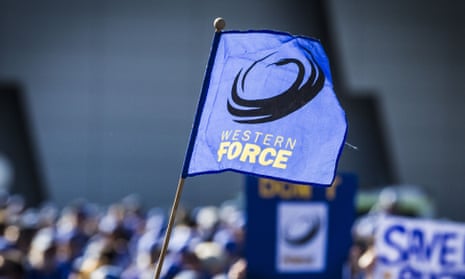“A house divided against itself cannot stand” is a warning Rugby Australia seems to be heeding as the national governing body grapples with the advent of mining billionaire Andrew Forrest’s new venture, Rapid Rugby.
Already hailed as an alternative to the established Super Rugby tournament, Rapid Rugby has the potential to tear the game asunder in Australia similar to the Super League war which wreaked havoc on rugby league in the mid-1990s.
Rapid Rugby will involve eight teams across the Asia-Pacific region, including the Perth-based Western Force, as well as sides from Malaysia, Singapore, Hong Kong, Fiji, Samoa and Japan. There are also plans for teams in Western Sydney, China and India further along.
If Rapid Rugby, which will run concurrently with Super Rugby, becomes a competitor for players, crowds, sponsorship and broadcast revenue, the new competition could potentially convulse the game at a time when it is already fragile both commercially and competitively.
Yet, at this point Rugby Australia does not see Rapid Rugby as a direct threat to Super Rugby and the Wallabies, but rather a potential partner in growing the game, particularly in Asia. This explains RA’s swift sanctioning of the new competition.
RA is anxious to work with Forrest to promote and develop the game in Western Australia following the bloody axing of the Western Force from Super Rugby last year, the incident which triggered Forrest’s involvement in the game.
Rather than viewing Rapid Rugby as hostile, RA is looking at how the new competition can benefit all parties.
“I think Andrew’s intention is to try to strengthen the game of rugby in Asia and to work collaboratively with World Rugby and Rugby Australia in doing that,” Rugby Australia director and former Wallaby Brett Robinson said.
“From our perspective Super Rugby is the premier competition in Australia. I don’t think he is in direct competition with us. This is another vehicle allowing for semi-professional and professional players to participate in the game in this country.
“We see it as a great opportunity to support the Western Force participating in a meaningful competition. That’s a great thing for the game in Western Australia and young boys who have the aspiration to play at that level, which provides more players available to the national team.”
Forrest is committed to signing 20 of the world’s best players over the next two years. If Rapid Rugby poached players from Australia’s four remaining Super Rugby teams – the Brumbies, Melbourne Rebels, NSW Waratahs and Queensland Reds – it would cause friction.
But if Forrest was able to lure Australians playing in Europe and Japan to the Force, that would enhance the player pool for the Wallabies. Force players are still eligible for the Wallabies because the Perth-based side continues to play in the Rugby Australia-sponsored National Rugby Championship, a third-tier competition beneath Super Rugby.
“I know Andrew has ambitions to bring marquee players into each of the sides,” Robinson said. “If those players are Australian players, that’s a good thing for the game and ultimately for the Wallabies.
“We would like to see the Wallabies succeed globally. Any efforts by Andrew to support Rugby Australia’s desire to see our national team succeed is where we would like to go and he has made it very clear that sits at the heart of his intentions.
“Anything that he is doing to try to support that is great. I guess he is doing something new, it’s fresh, it’s got risk around it, but ultimately he is investing money into the game and that can only be a good thing.”
Forrest’s designs on Western Sydney could become a source of friction, particularly with the NSW Rugby Union, which runs the Waratahs Super Rugby franchise. Western Sydney is a fast-growing region which feels neglected by the rugby establishment, but NSW is unlikely to cede a two million population base.
Ideally, Rugby Australia would prefer Forrest to invest in an expanded NRC rather than set up a new competition, but they are keen to keep him inside the tent.
“World Rugby are in the middle of some significant conversations about the potential to establish an international calendar that is meaningful,” Robinson said. “That will have impacts potentially on The Rugby Championship and other competitions that sit underneath that.
“We would like to think we could work with Andrew on the layers of competitions that ultimately produce Wallabies. That’s the intention. There is a lot from a top down perspective to play out around competition structures that ultimately impact on Super Rugby and the third-tier competition in Australia.
“We’d like to continue to work with Andrew as those things develop and hopefully what he is doing aligns with what we are doing as the governing body in Australia.”

Comments (…)
Sign in or create your Guardian account to join the discussion